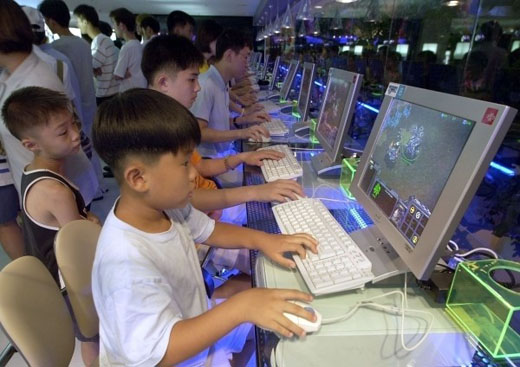
South Korea and eSports – The fastest growing industry the in country
The term “eSports” is now well-known for a lot of people, and when i say a lot i mean millions worldwide, this new trend that saw a wide spread across the globe with its competitions in famous competitive games like League of Legends and Dota is one step away from being an official recognized sport, with Universities in the US giving scholarships to its pro players as if they’re real athletes. So let’s take a look at South Korea, where this form of entertainment is already a norm just like cinemas and TV.
Korea is once again a leading force in technology related fields, supporting eSports before it saw the wide spread by organizing competitions and training professionals sponsored by big companies and cheered by their fans. Similar event took place in Seoul few weeks ago, where 40 thousand fans attended a football stadium that was once used in 2002 World Cup’s semi-finals to watch the League of Legends Season 4 finale, one of the most famous games ever.
On stage two teams formed of 5 players sitting in front of their screens in a mission to destroy the opponent base with their selected heroes, with huge screens broadcasting the whole thing to the big audience.
Fans leaning towards Samsung White was no surprise, a team of professional local Korean pros, which managed to snatch the victory from Star Horn Royal Club with its Chinese and Korean players hybrid, winning a prize pool worth one million dollars and taking the champions title.
“Pro gaming exists in its current form and size in large part thanks to the people who made it possible in South Korea,” said Manuel Schenkhuizen, a Dutch pro gamer. “Other countries took years to catch up and are to this date trying to mimic some of their successes.”
Although stories vary between gamers and critics on how it all started, all of them begin in the 90’s of last century.
In that time, and in a response to the Asian financial crisis, the Korean government focused on Communications field and Internet infrastructures. By the year 2000, a vibrant community of gamers rose thanx to the famous internet cafe by the name of PC Bangs which implemented new connection structures. Clubs played the role of sharpening the skills of pro players.
Government took a direct role with the creation of Korean eSports Association which manages these kind of activities, and it was advertised on TV channels and Ads same way as any other sport like Football would in any other country.
Blizzard Entertainment released the first StarCraft in 1998, where it quickly became one of the main pillars of professional competitions in South Korea, with the support and sponsorship of Blizzard itself, in 2004, StarCraft pro League finale attracted more than 100 thousand fans to Gwangalli beach south of Busan.
Almost a decade ago, big companies started seeing the bright future of Pro players and sponsoring them, and for a long time Samsung has been sponsoring pro teams in training shelters where they train for 12 hours.
If you think that the life of an eSports player is all about fame and money just by playing, you should know that pro players train for long tiresome periods that extend to days in front of their PC screen, the coach CJ Entus says he always tries to encourage his trainees to enjoy what they do.
“The best way for players to enjoy themselves is to know how to win,” he said.
One of the famous players in CJ Entus, Hong Min-gi, said he still enjoys playing the game despite his commitment, and that’s usually because he wins everytime.
The success of the “League of Legends” teams in the country has attracted western teams like Cloud9 and Fnatic who had the curiosity on how do these teams train this professional. Many have tried to simulate the way of training and living of those teams in Korea, but usually their efforts didn’t succeed.
Players obsession has led to concern and questions about addiction and how dangerous it is to spend long times playing video games. News reports have spread about the death of one of the players in PC Bangs after playing restlessly for days, and that led to enforcing a new law to force children under 18 to leave before 10pm.
Jun Byung-hun the head of the country’s e-sports governance body said there was still a lot of ignorance from older generations about video gaming. “In Korea, games are the barometer of the generation gap,”. The Parents view games as a distraction from studying, while the Youth view it as an important part of their social existence. So new educational guidelines was promoted to encourage schools to warn students about addiction while also helping parents better understand gaming.
“The best way to avoid addiction is for families to play games together,” he said.
Mr. Jun helped to encourage South Korean institutions to treat e-sports like real sports. Most recently he helped convince Chung-Ang University to admit two students based on their successes in e-sports.
Before days of the League of Legends championship and in a Hotel near the stadium that Samsung White trained in, Cho Se-hyoung the team leader felt pressured from the massive country’s fan base, he thought of retirement. and even after winning the competition he apologized to fans for not showing a more creative side in the match. But talk of changing careers seemed more distant. He said the team had to get back to work to prepare for future competitions, and when he was asked how does he view himself in the middle of all of this he said “i’m a sports player”.






